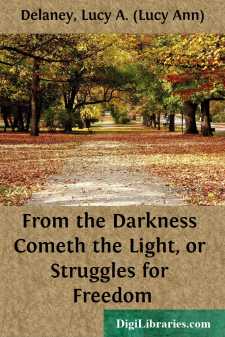Categories
- Antiques & Collectibles 13
- Architecture 36
- Art 48
- Bibles 22
- Biography & Autobiography 813
- Body, Mind & Spirit 142
- Business & Economics 28
- Children's Books 17
- Children's Fiction 14
- Computers 4
- Cooking 94
- Crafts & Hobbies 4
- Drama 346
- Education 46
- Family & Relationships 57
- Fiction 11829
- Games 19
- Gardening 17
- Health & Fitness 34
- History 1377
- House & Home 1
- Humor 147
- Juvenile Fiction 1873
- Juvenile Nonfiction 202
- Language Arts & Disciplines 88
- Law 16
- Literary Collections 686
- Literary Criticism 179
- Mathematics 13
- Medical 41
- Music 40
- Nature 179
- Non-Classifiable 1768
- Performing Arts 7
- Periodicals 1453
- Philosophy 64
- Photography 2
- Poetry 896
- Political Science 203
- Psychology 42
- Reference 154
- Religion 513
- Science 126
- Self-Help 84
- Social Science 81
- Sports & Recreation 34
- Study Aids 3
- Technology & Engineering 59
- Transportation 23
- Travel 463
- True Crime 29
From the Darkness Cometh the Light, or Struggles for Freedom
Categories:
Description:
Excerpt
CHAPTER I.
"Soon is the echo and the shadow o'er,Soon, soon we lie with lid-encumbered eyes
And the great fabrics that we reared before
Crumble to make a dust to hide who dies."
In the year 18—, Mr. and Mrs. John Woods and Mr. and Mrs. Andrew Posey lived as one family in the State of Illinois. Living with Mrs. Posey was a little negro girl, named Polly Crocket, who had made it her home there, in peace and happiness, for five years. On a dismal night in the month of September, Polly, with four other colored persons, were kidnapped, and, after being securely bound and gagged, were put into a skiff and carried across the Mississippi River to the city of St. Louis. Shortly after, these unfortunate negroes were taken up the Missouri River and sold into slavery. Polly was purchased by a farmer, Thomas Botts, with whom she resided for a year, when, overtaken by business reverses, he was obliged to sell all he possessed, including his negroes.
Among those present on the day set apart for the sale was Major Taylor Berry, a wealthy gentleman who had travelled a long distance for the purpose of purchasing a servant girl for his wife. As was the custom, all the negroes were brought out and placed in a line, so that the buyers could examine their good points at leisure. Major Berry was immediately attracted by the bright and alert appearance of Polly, and at once negotiated with the trader, paid the price agreed upon, and started for home to present his wife with this flesh and blood commodity, which money could so easily procure in our vaunted land of freedom.
Mrs. Fanny Berry was highly pleased with Polly's manner and appearance, and concluded to make a seamstress of her. Major Berry had a mulatto servant, who was as handsome as an Apollo, and when he and Polly met each other, day after day, the natural result followed, and in a short time, with the full consent of Major Berry and his wife, were married. Two children were the fruit of this marriage, my sister Nancy and myself, Lucy A. Delaney.
While living in Franklin county, Major Berry became involved in a quarrel with some gentleman, and a duel was resorted to, to settle the difficulty and avenge some fancied insult. The major arranged his affairs and made his will, leaving his negroes to his wife during her life-time and at her death they were to be free; this was his expressed wish.
My father accompanied Major Berry to New Madrid, where the fatal duel was fought, and stayed by him until the end came, received his last sigh, his last words, and closed his dying eyes, and afterwards conveyed the remains of his best friend to the bereaved family with a sad heart. Though sympathizing deeply with them in their affliction, my father was much disturbed as to what disposition would be made of him, and after Major Berry was consigned with loving hands to his last resting place, these haunting thoughts obtruded, even in his sleeping hours.
A few years after, Major Berry's widow married Robert Wash, an eminent lawyer, who afterwards became Judge of the Supreme Court. One child was born to them, who, when she grew to womanhood, became Mrs. Francis W. Goode, whom I shall always hold in grateful remembrance as long as life lasts, and God bless her in her old age, is my fervent prayer for her kindness to me, a poor little slave girl!
We lived in the old "Wash" mansion some time after the marriage of the Judge, until their daughter Frances was born....


